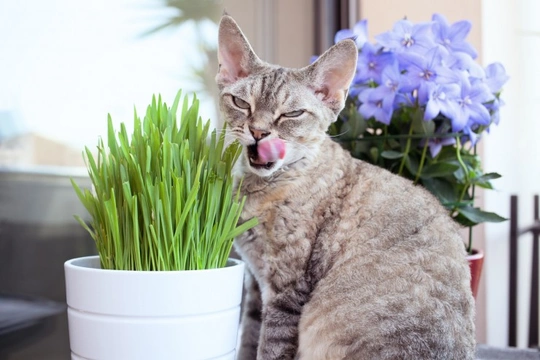
Herbs that are Safe to give to Cats
If you share your home with a pussy cat or two, undoubtedly you will be familiar with the fact your feline friends have a real addiction to a herb called catnip which they never seem to get enough of. The herb has an extraordinary effect on cats with some of them getting really excited whenever they are near it whereas other cats become relaxed when they get a whiff of it.
A cat's metabolism is very sensitive which means you have to be careful which herbs you give them if you decide to treat any illnesses or ailments using natural products. Below is a list of herbs that can be safely given to cats:
Treating Infections: immune system, to promote healing
There are certain herbs which are very effective at treating infections and promoting the healing process by stimulating the immune system. These include the following:
- Goldenseal
- Calendula
- Red clover
All of these are safe to give to our feline friends, but you have to get the dosage right. Most of the liquid forms on the market are concentrated and cannot be given to cats without diluting them first. The rule of thumb is to always buy products specifically formulated for use on cats.
Digestive disorders, stomach upsets and lack of appetite
It can be very worrying when a cat suddenly goes off their food and getting them to eat again can be challenging. However, there are specific herbs that help improve their appetites which include the following:
- Caraway
- Nettle
- Dill
You can use dried herbs adding one or the other to your cat's food a little at a time so they get used to the new taste. However, all three of these herbs have a pleasant smell which cats tend to like. This is especially true of dill which has a slight aniseed odour to it.
Anti-inflammatory herbs
Goldenseal is one herb that has extremely effective anti-inflammatory properties and which is safe to give to cats. It is very useful when treating our feline friends for viruses because it strengthens their immune systems. You can also use it topically when treating any sort of minor cut or abrasion and it’s particularly good when used as an eye wash.
Allergies, respiratory issues and sinus problems
Cats often suffer from allergies and respiratory issues that can often be hard to clear up which is where specific herbs can really help, these include the following:
- Eyebright
- Nettle
- Red Clover
All of the above are effective at treating watery eyes, bouts of sneezing, a blocked nose and coughing. Again, these herbal remedies are often sold in liquid form which is quite concentrated unless it has been specifically formulated for use on cats. It's far better to use an holistic treatment that has been formulated for use on our feline friends because if you use anything that's too concentrated, you may well do more harm than good.
Urinary tract issues
Cats also frequently suffer from urinary tract issues which are not only very painful but dangerous to their well-being too. There are some great herbs that can safely be used on cats which are super effective at treating urinary problems which include the following:
- Cranberry
- Nettle
Again, it is better to use cranberry and nettle herbal treatments that have been specifically formulated for use on cats and to dilute any that may be too concentrated. If you have any doubts, you should discuss your concerns with your vet before you give your cat any.
Super-herbs safe to give to cats
There are some super-herbs which are known to be extremely useful when treating certain conditions that cats commonly suffer from. Two of which are red clover and parsley which help prevent the growth of tumours. However, parsley is also really effective at treating indigestive issues and swollen glands. It's also particularly good at treating coughs and kidney issues. Red clover is known to be a great antibiotic and is often used to relieve the pain associated with arthritis.
How to Give Your Cat Herbal Remedies
As with any medicine or supplement, it's best to discuss things with your vet before you give your pussy cat any sort of herbal remedy whether it is an oral treatment or a topical one no matter how “natural” they are. If your cat is already being given certain drugs a herbal treatment could interfere with the medication and could even cause toxicity issues. A vet would also be able to advise you on the right dosage to give your cat and if you would need to dilute them to get the dosage right.
Conclusion
It’s always a good idea to keep a few holistic and herbal remedies in your pet medicine cabinet for emergencies. However, before you give any sort of herbal treatment to your cat whether it’s a topical application or an oral treatment, you should discuss things with your vet first to make sure you get the dosage right. Cats have very delicate systems and cannot cope with high concentrations of any herbs so to be really sure, you should always invest in herbal remedies that have been specifically formulated for use on our feline friends.



